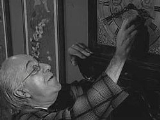
Ninety Years Without Slumbering
Encyclopedia
"Ninety Years Without Slumbering" is an episode of the American television anthology series The Twilight Zone
. The title comes from the lyrics of the song My Grandfather's Clock
.
stops ticking. He spends all of his time working on the clock, upsetting his family with his obsession. He speaks with a psychiatrist and reveals his fear. The psychiatrist advises him to sell the clock, which he does, but offers to maintain it for the new owners. Two weeks after he sells the clock, the new owners go on vacation for the weekend, so Sam cannot wind the clock. The clock stops, so he is forced to confront his fear of death (and his "spirit," informing him "It's time to go"). He chooses to stop believing in the clock's "power," declaring instead that he wants to live to see his great-grandchild grow up- so he therefore continues to live (and the "spirit" vanishes). As he tells his expectant granddaughter, "When that clock died, I was born again."
, "Tick of Time." Most notably, in "Tick of Time" the main character did indeed die when the clock stopped. Johnson did not approve of the changes made to his story, and was credited onscreen under a pseudonym.
This episode was Bernard Herrmann's final score for the series.
The Twilight Zone
The Twilight Zone is an American television anthology series created by Rod Serling. Each episode is a mixture of self-contained drama, psychological thriller, fantasy, science fiction, suspense, or horror, often concluding with a macabre or unexpected twist...
. The title comes from the lyrics of the song My Grandfather's Clock
My Grandfather's Clock
"My Grandfather's Clock" is a song written in 1876 by Henry Clay Work, the author of "Marching Through Georgia". It is a standard of British brass bands and colliery bands, and is also popular in bluegrass music.-Origin of the song:...
.
Synopsis
Sam Forstmann is an old man who thinks he will die if his grandfather clockLongcase clock
A longcase clock, also tall-case clock, floor clock, or grandfather clock, is a tall, freestanding, weight-driven pendulum clock with the pendulum held inside the tower, or waist of the case. Clocks of this style are commonly 1.8–2.4 metres tall...
stops ticking. He spends all of his time working on the clock, upsetting his family with his obsession. He speaks with a psychiatrist and reveals his fear. The psychiatrist advises him to sell the clock, which he does, but offers to maintain it for the new owners. Two weeks after he sells the clock, the new owners go on vacation for the weekend, so Sam cannot wind the clock. The clock stops, so he is forced to confront his fear of death (and his "spirit," informing him "It's time to go"). He chooses to stop believing in the clock's "power," declaring instead that he wants to live to see his great-grandchild grow up- so he therefore continues to live (and the "spirit" vanishes). As he tells his expectant granddaughter, "When that clock died, I was born again."
Production notes
"Ninety Years Without Slumbering" was a drastic reworking of an original script by George Clayton JohnsonGeorge Clayton Johnson
George Clayton Johnson is an American science fiction writer most famous for co-writing the novel Logan's Run with William F. Nolan...
, "Tick of Time." Most notably, in "Tick of Time" the main character did indeed die when the clock stopped. Johnson did not approve of the changes made to his story, and was credited onscreen under a pseudonym.
This episode was Bernard Herrmann's final score for the series.

